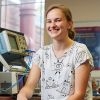
Kim Spijkers-Shaw
- Course: Natural Sciences MNatSc, BSc
Student Kim Spijkers-Shaw tells us about her experience studying Natural Sciences at the University of Leeds. She did Physics, Chemistry and Mathematics in her first year, and focussed on Physics and Mathematics in her last three years. This meant that she had to do all of the core Physics modules and with an Applied Mathematics focus including Fluid dynamics.
It's a time consuming but rewarding course, with a lot of hours but loads of freedom about the structure and the possibility to direct it towards exactly the content I'm interested in.
Watching this video in China? View this video on Youku.
Living in Leeds
“The campus has a very friendly feel to it as it is always a hub of activity with the union at its centre, yet it is so close to the city centre that its easy to escape the bubble into the real world sometimes. The leisure scene is great, there's a huge variety and there's pretty much always a quiz or a music event going on somewhere.”
Apart from concentrating on her studies, Kim is also on the women's water polo team, She finds that regular training and fixtures are a really good way to destress after a long day at university, and winning matches is always nice. She also plays Quidditch, a very different sport that is growing more and more widely played. She added,
“The Quidditch community is incredible, they demonstrate just how easy it can be to find a group of like minded people amongst the huge student population in a society.”
Interdisciplinary research
Kim finds that most of the important topics of research in modern science branch over more than one of the classic sciences, “so researchers require a good knowledge of more than one”. She added,
I think it is very important that research scientists who are working together have at least a base understanding of other sciences besides their specialism. Interdisciplinary research is key to tackling the big questions in science today.
Find out more
Discover more about our Undergraduate degree courses in the School of Chemistry.

